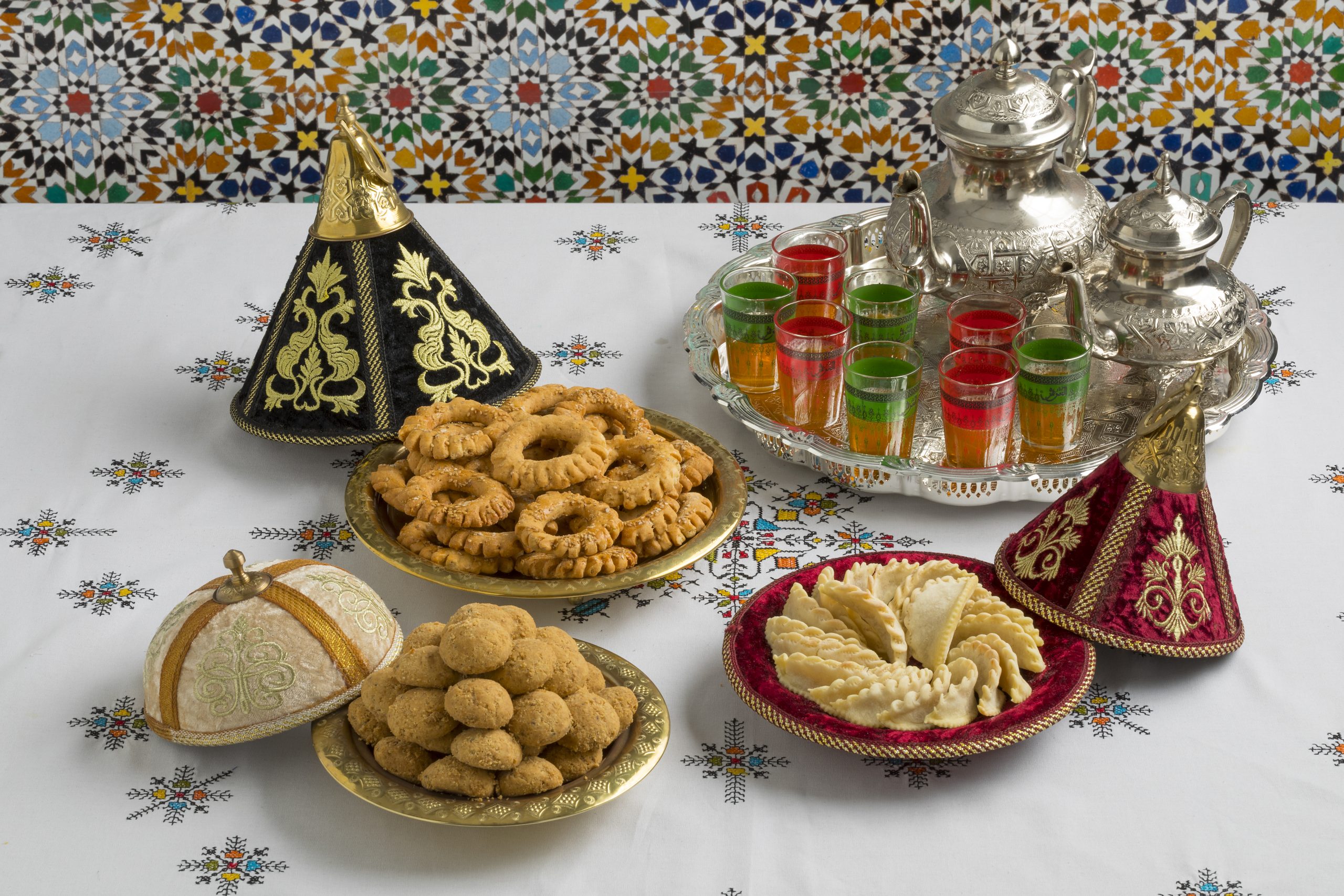Introduction
Ramadan, the holiest month in the Islamic calendar, is a time of spiritual reflection, prayer, and fasting observed by Muslims worldwide. Fasting during Ramadan involves abstaining from food, drink, smoking, and other physical needs from dawn until sunset. While fasting is a fundamental aspect of Ramadan, it’s essential to prioritize health and nutrition to ensure well-being during this sacred month. In this article, we explore the significance of Ramadan fasting, guidelines for maintaining a healthy diet, and practical tips for nutritious eating during this time.

What is the reason for fasting in Ramadan?
During Ramadan, Muslims fast from dawn (Suhoor) until sunset (Iftar), refraining from consuming food and drink during daylight hours. The fast is broken each evening with the Iftar meal, a communal gathering where families and friends come together to share in the blessings of food and fellowship. Fasting is an act of worship and self-discipline, intended to foster empathy, gratitude, and spiritual growth.

How to eat healthy during Ramadan?
- Suhoor and Iftar Meals:
- Suhoor, the pre-dawn meal, should include nutrient-rich foods such as whole grains, lean proteins, fruits, vegetables, and plenty of fluids to sustain energy throughout the day.
- Iftar, the evening meal to break the fast, should begin with dates and water, followed by a balanced meal consisting of complex carbohydrates, lean proteins, healthy fats, and vegetables.
- Hydration:
- Stay hydrated during non-fasting hours by consuming water and hydrating beverages such as herbal teas, fresh juices, and coconut water.
- Limit caffeinated and sugary beverages that can contribute to dehydration and energy fluctuations.

- Balanced Nutrition:
- Aim for balanced meals that provide essential nutrients including vitamins, minerals, fiber, and antioxidants.
- Include a variety of food groups in your meals to ensure a diverse and nourishing diet.
- Portion Control:
- Practice mindful eating and portion control to avoid overeating during Iftar and Suhoor meals.
- Focus on quality over quantity, savoring each bite and paying attention to hunger cues.
How to stay healthy while fasting?
- Incorporate light physical activity such as walking or gentle stretching during non-fasting hours to promote circulation and energy levels.
- Choose nutrient-dense foods that provide sustained energy and promote feelings of fullness and satisfaction.
- Plan and prepare nutritious meals in advance to streamline the cooking process and avoid last-minute temptations.
- Listen to your body’s hunger and fullness cues, eating mindfully and attentively during Suhoor and Iftar meals.
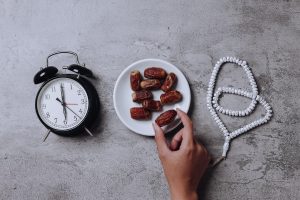
What to eat during Ramadan?
During Ramadan, it’s essential to prioritize nutritious and wholesome meals to sustain energy levels throughout the day and promote overall well-being.
Try some of the following healthy and delicious ideas:
- Lentil Soup:
- Ingredients: Lentils, onions, carrots, celery, garlic, vegetable broth, cumin, turmeric, salt, pepper.
- Instructions: Sauté onions, carrots, celery, and garlic. Add lentils, vegetable broth, and spices. Simmer until lentils are tender. Blend until smooth.
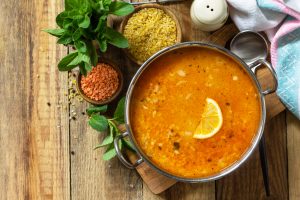
- Grilled Chicken Salad:
- Ingredients: Grilled chicken breast, mixed greens, cherry tomatoes, cucumbers, bell peppers, feta cheese, olives, olive oil, lemon juice, salt, pepper.
- Instructions: Combine grilled chicken and vegetables in a bowl. Drizzle with olive oil, lemon juice, salt, and pepper. Toss gently to coat.
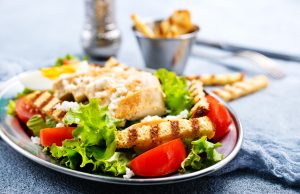
- Quinoa Tabbouleh:
- Ingredients: Cooked quinoa, parsley, tomatoes, cucumbers, green onions, mint, lemon juice, olive oil, salt, pepper.
- Instructions: Combine quinoa and chopped vegetables in a bowl. Add lemon juice, olive oil, salt, and pepper. Mix well and refrigerate before serving.
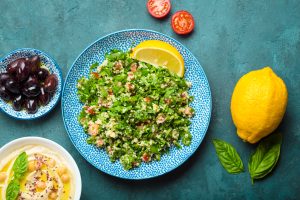
- Chickpea Curry:
- Ingredients: Chickpeas, onions, garlic, ginger, tomatoes, coconut milk, curry powder, turmeric, cumin, coriander, salt, pepper.
- Instructions: Sauté onions, garlic, and ginger until fragrant. Add tomatoes and spices, cook until softened. Stir in chickpeas and coconut milk. Simmer until flavors meld.
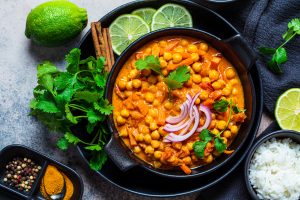
- Stuffed Bell Peppers:
- Ingredients: Bell peppers, ground turkey or beef, quinoa or rice, onions, garlic, tomatoes, tomato sauce, cheese (optional), salt, pepper, herbs.
- Instructions: Cut tops off bell peppers and remove seeds. Sauté onions and garlic, add ground meat and cook until browned. Stir in cooked quinoa or rice, diced tomatoes, tomato sauce, and herbs. Stuff peppers with mixture, top with cheese if desired, and bake until peppers are tender.
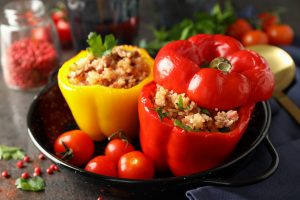
Conclusion
Observing a healthy diet during Ramadan is essential for maintaining optimal health and well-being while honoring the spiritual significance of fasting. By prioritizing nutrient-rich foods, staying hydrated, and practicing mindful eating habits, individuals can navigate Ramadan with vitality, balance, and nourishment. As we come together in prayer, reflection, and community during this sacred month, let us also embrace the gift of health and wellness, nurturing our bodies, minds, and souls with gratitude and compassion. Ramadan Mubarak!
Disclaimer: The content on this blog is intended for general informational purposes only. It is not a substitute for professional medical advice, diagnosis, or treatment. Always consult qualified healthcare providers for personalized advice. Information regarding plastic surgery, dental treatment, hair transplant, and other medical procedures is educational and not a guarantee of results. We do not assume liability for actions taken based on blog content. Medical knowledge evolves; verify information and consult professionals. External links do not imply endorsement. By using this blog, you agree to these terms.

